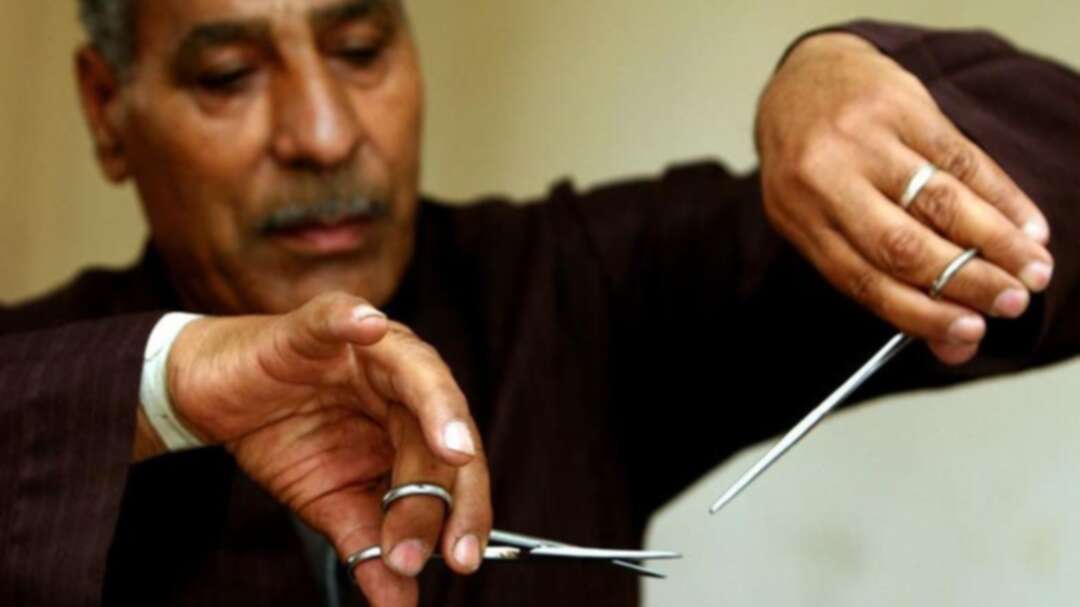-
Doctors in Egypt launch anti-genital cutting campaign after girl dies

Doctors in Egypt have taken time out of their surgeries for a campaign to raise awareness of the dangers of female genital mutilation (FGM) after the death of a 12-year-old girl, saying they do not want their white coats “stained with blood”.
Genital cutting of girls was banned in Egypt in 2008, but it remains persistent – a 2016 survey by the UN Children’s Fund showed 87 percent of women and girls aged 15-49 had undergone the procedure.
The campaign, entitled “White Coats”, saw posters with the slogans “No to FGM” and “FGM is a Crime” put up at a Cairo metro station, where doctors in white coats gave out leaflets about the dangers of the practice.
Also read: It is time to stop FGM
Organizer Randa Fakhr al-Deen, head of the NGOs’ Union Against Harmful Practices on Women and Children, said the doctors had faced challenges from proponents of FGM at the station, but the campaign was important.
“We want to send a message to other doctors that we do not want our white coats to be stained with blood as well as to citizens that medicine refuses this practice,” she told the Thomson Reuters Foundation.
“Some ultraconservatives were not convinced of what we were saying, but we opened a discussion with them, responded to their arguments and answered all their questions,” she added.
World leaders have pledged to eradicate FGM by 2030, but campaigners say the ancient ritual, which typically involves the partial or total removal of the external genitalia, remains deeply entrenched in many places.
It can cause long-lasting mental and physical health problems including chronic infections, menstrual problems, infertility, pregnancy, and childbirth complications.
Last month Egyptian authorities arrested a retired doctor on a charge of carrying out illegal FGM surgery and causing the death of a 12-year-old girl. The girl’s parents were also arrested.
All have since been released, but investigations are continuing and campaigners against FGM say they expect them to face trial.
The ritual is underpinned by the desire to control female sexuality but is often justified for cultural or religious reasons in conservative societies.
Women and children’s rights groups in Egypt say the ban has not been well enforced and that much of society is permissive of FGM, which is widely practiced by both Christians and Muslims.
The majority of FGM procedures are carried out by doctors and nurses at private clinics, with the rest done at home, according to the Egypt Demographic and Health Survey of 2014.
“It is a religious thing. Do you want to change religion?” said metro user Ibrahim Hassan in response to the “White Coats” campaign. “You only listen to what the West is saying.”
In response, Fakhr al-Deen told Hassan that FGM had no basis in religion and was not taught in medical schools in Egypt.
source: Reuters
You May Also Like
Popular Posts
Caricature
BENEFIT Sponsors BuildHer...
- April 23, 2025
BENEFIT, the Kingdom’s innovator and leading company in Fintech and electronic financial transactions service, has sponsored the BuildHer CityHack 2025 Hackathon, a two-day event spearheaded by the College of Engineering and Technology at the Royal University for Women (RUW).
Aimed at secondary school students, the event brought together a distinguished group of academic professionals and technology experts to mentor and inspire young participants.
More than 100 high school students from across the Kingdom of Bahrain took part in the hackathon, which featured an intensive programme of training workshops and hands-on sessions. These activities were tailored to enhance participants’ critical thinking, collaborative problem-solving, and team-building capabilities, while also encouraging the development of practical and sustainable solutions to contemporary challenges using modern technological tools.
BENEFIT’s Chief Executive Mr. Abdulwahed AlJanahi, commented: “Our support for this educational hackathon reflects our long-term strategic vision to nurture the talents of emerging national youth and empower the next generation of accomplished female leaders in technology. By fostering creativity and innovation, we aim to contribute meaningfully to Bahrain’s comprehensive development goals and align with the aspirations outlined in the Kingdom’s Vision 2030—an ambition in which BENEFIT plays a central role.”
Professor Riyadh Yousif Hamzah, President of the Royal University for Women, commented: “This initiative reflects our commitment to advancing women in STEM fields. We're cultivating a generation of creative, solution-driven female leaders who will drive national development. Our partnership with BENEFIT exemplifies the powerful synergy between academia and private sector in supporting educational innovation.”
Hanan Abdulla Hasan, Senior Manager, PR & Communication at BENEFIT, said: “We are honoured to collaborate with RUW in supporting this remarkable technology-focused event. It highlights our commitment to social responsibility, and our ongoing efforts to enhance the digital and innovation capabilities of young Bahraini women and foster their ability to harness technological tools in the service of a smarter, more sustainable future.”
For his part, Dr. Humam ElAgha, Acting Dean of the College of Engineering and Technology at the University, said: “BuildHer CityHack 2025 embodies our hands-on approach to education. By tackling real-world problems through creative thinking and sustainable solutions, we're preparing women to thrive in the knowledge economy – a cornerstone of the University's vision.”
opinion
Report
ads
Newsletter
Subscribe to our mailing list to get the new updates!






















